|
 For the visual arts, participants may use media
such as paper, clay, leather, fiber, wood, chalk/carbon/pigment,
glass/plastic, metal, and nature to produce their art. The art can
also be 3D or computer generated. For the visual arts, participants may use media
such as paper, clay, leather, fiber, wood, chalk/carbon/pigment,
glass/plastic, metal, and nature to produce their art. The art can
also be 3D or computer generated.
Non-original arts are made from either kits, pre-printed designs, or
pre-molded pieces. Original arts are designs created completely by
the exhibitor.
Other projects included animal science, career/leadership, general
entomology, floriculture, horticulture and photography.
Visual arts are judged on correct use of design elements,
principles, expressive elements and technique. Other important areas
are the craftsmanship, creativity and inventiveness.
As visual arts judges Heather McAfee, Rebekah Johnson and Colleen
Roate talked to 4-H members, they asked participants to explain why
they chose their project, its focus and the technique they used in
addition to describing the design elements and focus.
With photography, Judge Kim Wiggers de Otte asked the participants
about why they chose the photo and what they learned, as well as
reviewing elements of composition, focus and depth of field.
For woodworking projects, Judge Rick Kidd asked the children about
their inspiration for their project, tools and techniques used,
reading a tape measure and procedures for building their project,
and he emphasized practicing safety measures such as wearing
protective glasses.
Both during and after judging, judges make comments telling
participants where they did well and discussing how and where they
could improve. The 'minute' details can be significant.
Several 4-H members did projects using various media and entered
both visual and non-visual projects, while others focused on one
project. Many have been working on their projects for the past few
months.
Of the 235 4-H members, many were participants that entered multiple
projects in differing categories. Many exhibitors had entered 4-H
projects before, there were a few entering for the first time.
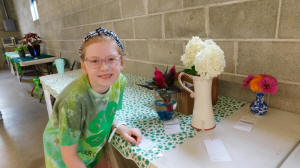
For example, nine-year-old Olivia Wrage was previously part of the
4-H Cloverbud program, but it is her first year competing as a 4-H
member. Her entries included a floriculture project, a clay pot and
colorful glass art. Wrage said she worked on these projects all
through July.

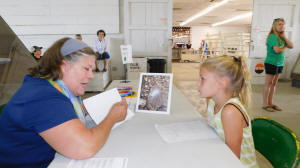
Nine-year-old Lila Cross is in her first year of 4-H and did both
visual arts and photography projects. Cross’ drawing was of the
ocean and her photo was of a white caterpillar. She chose the white
caterpillar because it stood out among the brown caterpillars.
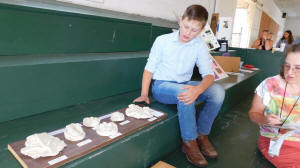
Ten-year-old Ryan Wrage is in his second year of 4-H, but it was his
first year entering projects. Wrage’s projects were animal tracks
and bugs. For the animal tracks, Wrage said he got the deer, heron,
coyote and raccoon tracks from a mud spot in their pond that was low
due to the drought. He used plaster of Paris poured into the track,
put it in a disposable container over it for shape until it
hardened, then put everything on a wood board he prepped to display.
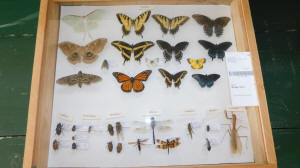

Wrage caught the insects and butterflies with a net in an open
field. Once they were frozen then dried, he carefully pinned them to
the display board and added printed identification labels.
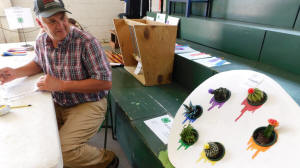
Rosetta Caterson got witty crossing several categories in wood
working, art, horticulture and nature. She cut wood in the shape of
an oversized paint pallet, mounted real potted cacti and succulents
with primary and secondary colors accenting.
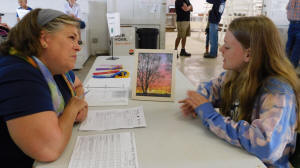
Eleven-year-old Ava Eeten is in her second year of 4-H. She entered
a photo of a tree at sunset. Eeten said she chose to enter the photo
because of all the colors.
[to top of second column] |

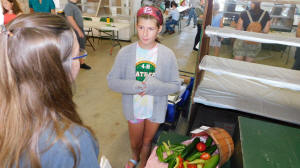
Eleven-year-old Grace Nutter is also in her second year of 4-H. She
entered three crops’ projects. One was a “cornucopia” display with
cucumbers, green beans and two types of peppers and tomatoes. Her
Roma tomato and Big Bertha peppers were displayed on plates. Nutter
said she grew them because she likes these vegetables.
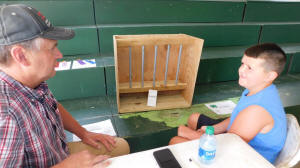
In his third year of 4-H, 10-year-old Tanner Jones entered four
projects that included woodworking, electrical, tractor uses and
crops. Jones’ woodworking project was a feeder for his goats.

Tanner's electrical project was a functioning light bulb. His crops
projects were onions and cucumbers. The 'tractor uses' project was
made using Legos and showed a tractor in a field.
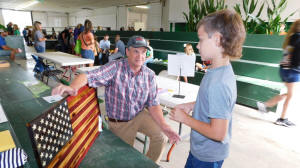
Twelve-year-old Tucker Garey is in his sixth year of 4-H and did
woodworking and metal projects. The woodworking project was painted
wood pieced together as an American Flag. He explained in detail to
Judge Rick Kidd how he did the project from start to finish.
Garey’s metal working project was a person made using various metal
pieces welded together. For this project, Garey said he used bent
steel, a hotdog stick, lynch pins, springs and a screw cap.
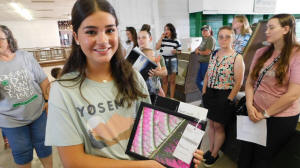
Fourteen-year-old Ella Klokkenga is in her third year of 4-H and
entered photography and floriculture projects. For the photo,
Klokkenga did a close up of a plant leaf, which shows the different
colors and veining. Her floriculture project was a flower
arrangement with sunflowers and other plants.
Fourteen-year-old Myah Bowman is in her seventh year of 4-H and has
entered projects several times. This year, Bowman’s entry was a
scrapbooking project. She said the scrapbook contains photos taken
between last summer and this summer. Many were of events during
eighth grade.
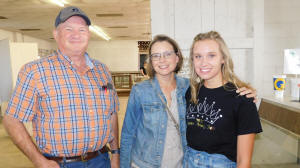

Logan County Fair Queen 2021 Caroline Ahrends (right) was finishing
up her year-long duties. One of her favorite memories has been
mentoring and encouraging the younger women. She was escorted by mom
Marty Orris and they are joined here with Logan County Fair Board
President John Fulton, who also attended the Monday 4-H events and
moved about the grounds overseeing activities.
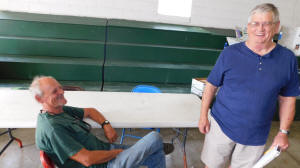
Also, keeping vigilance all morning was 4-H Projects Superintendent
Harry Hild. Hild was moving about and available to judges, showing
interest to participants, and visited with old friends of the fair
when he had a moment. Fair supporter John Parr shares a laugh with
Hild.
The Monday morning event with all the county 4-H participants
arriving at the same time and waiting to be judged used to be a
packed, loud, hard to move through space, though it was quite
organized. One change has eliminated those challenges. Area 4-H
Clubs are scheduled to arrive by club at varying times.

University of Illinois Extension Director Terri Casey said the
change has made a more relaxed atmosphere where judges and
participants can get more focused together discussing each project.
Judges don't feel rushed seeing a line of waiting kids, hearing is
better and this allows more enjoyable teaching moments. The only
drawback Casey sees might be that club members don't get to see all
the other 4-H members from Logan County at the same event.
As usual, the visual, non-visual arts and general projects section
highlighted the talents of many children from around Logan County.
Winning entries are on display in the Expo building throughout the
week of the fair.
[Angela Reiners/with contributions by
Jan Youngquist] |